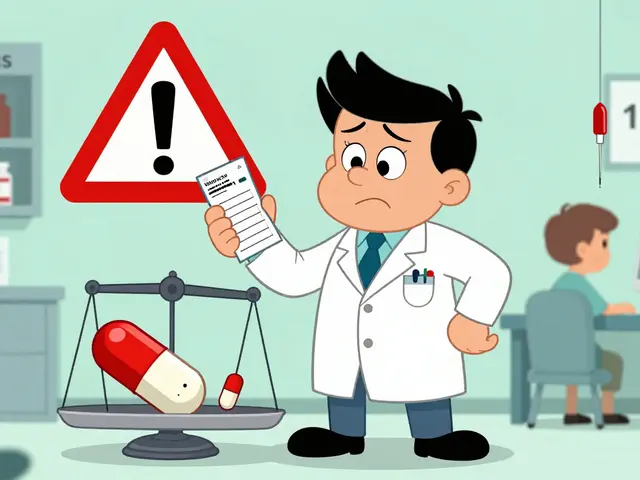Think you might be low on vitamins just because you feel tired or have brittle nails? You’re definitely not alone. Googling symptoms, reading wellness blogs, and taking online quizzes might feel empowering, but this habit often leads people down the wrong path. Missing out on the vitamins your body truly needs isn’t something you want to gamble with.
Jumping straight to supplements or diet changes based on a guess can actually make things worse. You might mask a real health issue or overload on vitamins, which isn’t harmless. For example, taking too much vitamin A can give you headaches, joint pain, and even damage your liver—and that’s just one example. Instead of playing detective, it pays to understand what your symptoms might mean and when they can be tricky to figure out on your own.
- Why People Self-Diagnose Vitamin Deficiencies
- Common Signs and How They Mislead You
- The Real Risks of Guessing Your Deficiency
- Why Online Advice Often Makes Things Worse
- When to Ask a Professional for Help
- Smart Steps to Take If You’re Worried
Why People Self-Diagnose Vitamin Deficiencies
It feels easy and fast to try fixing your own health issues, especially when everyone’s tossing around advice online these days. Most people turn to self-diagnosis because they’re searching for quick answers. If you’re tired all the time, losing hair, or your skin looks dull, it’s tempting to blame a vitamin deficiency right away. Social media is packed with influencer stories and “what this symptom means” posts, so it’s no wonder this trend keeps growing.
Cost is another reason. Lots of folks skip the doctor due to rising healthcare prices, especially if symptoms feel mild. Getting bloodwork may sound expensive or inconvenient. Also, some genuinely believe supplements will solve everything, because stores and ads make it look that simple.
Dr. Michael Holick, a well-known vitamin D researcher, once said:
“We can’t assume that symptoms like tiredness or muscle aches mean you’re low in vitamins. There are dozens of causes, and treating yourself based on a guess can actually do harm.”
On top of that, search engines spit out millions of pages on every symptom. If you type “fatigue vitamin deficiency” into Google, you’ll get a ton of results before you’ve even finished the sentence. One study found that nearly 60% of adults have tried to diagnose themselves online at least once. Usually, it just leads to more confusion or paranoia.
Deal-seeking makes things even messier. Vitamins are stacked in every pharmacy and supermarket. You’ll see discounts, bundle offers, and “recommended by doctors” labels, which all create a sense of urgency to buy and try something just in case. People rarely realize that popping a multivitamin can mask a bigger health issue, or just be a waste.
Here’s what often draws people to self-diagnose a vitamin deficiency:
- Easy symptom checklists online
- Social pressure from family or friends
- Worries about healthcare costs
- Over-the-counter vitamins being so easy to get
- Constant ads promising “energy” or “immune boosts”
It all comes back to wanting answers now, not after a bunch of appointments or tests. But quick fixes can set off whole new problems.
Common Signs and How They Mislead You
It’s easy to spot a symptom and instantly think “Ah, this must be a vitamin deficiency!”—especially with all the info floating around online. The problem? Many of the classic signs are super vague or can mean a dozen different things.
Take tiredness, for example. Sure, low vitamin B12 or iron can make you feel wiped out, but so can stress, poor sleep, or even an underactive thyroid. Feeling muscle cramps? You might suspect you need more magnesium or potassium. But maybe you just pushed it a little too hard at the gym yesterday.
- Brittle hair or nails: Could be a lack of biotin, but also just the result of harsh shampoos, too much styling, or plain old genetics.
- Cracks at the corners of your mouth: Might be a shortage of B vitamins, but dehydration, lipstick allergies, or dental work can also cause this.
- Mood swings or brain fog: Low vitamin D can play a part, but so can hormones, sleep troubles, or anxiety.
If you want a real eye-opener, check out these common symptoms and their possible vitamin-related or unrelated causes:
| Symptom | Possible Vitamin Link | Other Possible Cause |
|---|---|---|
| Fatigue | B12, D, Iron | Lack of sleep, stress, thyroid |
| Hair loss | Biotin, Iron | Hormones, aging, genetics |
| Leg cramps | Magnesium, Potassium | Dehydration, exercise |
| Pale skin | B12, Iron | Genetics, low sun exposure |
What trips most people up is believing symptoms are exclusive to vitamin deficiency. But most of them overlap with totally unrelated problems. That’s why guessing leads to mistakes and wasted time. Your body’s signals deserve a closer look, not a wild guess—or a shopping spree in the supplement aisle.
The Real Risks of Guessing Your Deficiency
If you try to fix a vitamin deficiency based on gut feeling or random advice, you’re setting yourself up for all sorts of trouble. For starters, popping extra vitamins without knowing your real needs can mess with more than just your wallet. Some vitamins, especially A, D, E, and K, hang around in your body’s fat stores and can build up to toxic levels if you go overboard. For example, people have landed in the hospital from taking too much vitamin D—who knew you could get kidney stones just by trying to boost your energy?
It doesn't stop there. Playing the guessing game with self-diagnosis can hide bigger health problems. Your tiredness or hair loss might feel like a classic vitamin issue, but the real problem could be anemia, thyroid disease, or something else entirely. This misstep can delay important treatment and make your symptoms worse over time.
Here are risks you face if you self-diagnose and treat a vitamin deficiency without talking to a pro:
- Overdose and Toxicity: Fat-soluble vitamins (A, D, E, K) can accumulate to dangerous amounts, leading to symptoms like heart rhythm changes, liver damage, or nerve issues.
- Missed Diagnoses: Symptoms like fatigue or hair thinning aren’t just tied to vitamins. Jumping to conclusions may hide diabetes, celiac, or hormonal problems.
- Wasting Money: Buying supplements you don’t actually need adds up fast—and no, more isn’t always better.
- Drug Interactions: Some supplements mess with medicines you’re already taking, like blood thinners, antidepressants, or blood pressure pills, and that’s not something you want to find out the hard way.
If you’re curious just how common this is, a survey published by the Council for Responsible Nutrition found over 70% of supplement users never discuss their vitamin use with a doctor. That means a lot of people are flying blind, and the risks are more real than you’d think.
| Vitamin | Risks of Overuse | Early Symptoms |
|---|---|---|
| Vitamin A | Liver damage, headaches | Dizziness, nausea |
| Vitamin D | Kidney stones, high calcium | Weakness, confusion |
| Vitamin E | Bleeding risk | Weakness, blurred vision |
| Vitamin K | Blood clotting changes | Easy bruising |
So, before you grab that extra supplement bottle, think about whether you really know what your body needs. It’s just not worth the gamble.

Why Online Advice Often Makes Things Worse
The internet kind of turns everyone into an "expert" overnight, especially when it comes to vitamin deficiency. You’ll see blog posts, TikTok videos, even Reddit threads, all insisting that if you feel tired, you must be low on B12, or if you have hair loss, it’s definitely low iron. But real science just isn’t that simple, and a lot of these sources skip over crucial details.
Here’s what usually goes wrong with online advice:
- Symptoms get oversimplified. Tiredness or muscle cramps? There are dozens of possible causes, and just pinning them on vitamin deficiency is misleading. Some of these symptoms even overlap with sleep disorders, thyroid disease, or plain old stress.
- Dosage advice is all over the place. It's not rare to see influencers recommending megadoses that can actually be toxic—like taking way more vitamin A or vitamin D than you should.
- Anecdotes replace facts. Just because someone’s cousin felt better after taking zinc doesn’t mean it will solve your problem. Everyone’s body is different, and what works for one person might upset your system.
Check out this quick snapshot of "facts" usually found online versus what’s recommended by health professionals:
| Popular Online Claim | What Experts Say |
|---|---|
| "Any fatigue means B12 deficiency." | Fatigue can have many causes—B12 is just one possibility. |
| "Vitamin C megadoses prevent all colds." | Multiple studies show only mild benefit at best. |
| "You can’t overdose on water-soluble vitamins." | Overdoing it can still cause side effects, like kidney stones (vitamin C). |
Many supplement brands and websites also have a financial reason to push you toward self-diagnosing and then buying their products. They use buzzwords, dramatic before-and-after pictures, and glowing testimonials to catch your attention. In reality, figuring out whether you have a real vitamin deficiency usually needs lab work and a trained eye, not a one-size-fits-all quiz or a catchy Instagram story.
If you’re going to look up info online, stick with health sites linked to hospitals or well-known health organizations. And if advice sounds too good, easy, or dramatic to be true, it’s time to be skeptical.
When to Ask a Professional for Help
Sometimes, your body sends signals that shouldn’t be ignored. If you’ve been feeling off for more than a couple of weeks—maybe you’re always tired, getting sick often, or notice strange changes in your skin, hair, or nails—it’s a good time to hit pause and reach out to a healthcare provider. Self-treating with random supplements based on symptoms can do more harm than good, especially with vitamin deficiency issues.
Certain symptoms really need an expert’s eye. For example, unexplained weight loss, constant fatigue that doesn’t improve with sleep, numbness or tingling in hands or feet, or sudden vision problems could be red flags for something more than just a simple vitamin deficiency. These problems might even point to underlying conditions, so don’t let Google be your only advisor.
- Your symptoms are new, severe, or getting worse
- You have existing medical conditions like diabetes or kidney issues
- There’s a family history of deficiencies or autoimmune issues
- You’re pregnant, breastfeeding, or managing a chronic illness
- Supplements or diet changes haven’t helped after a month
Doctors or registered dietitians do more than just listen—they may order blood tests to check your actual vitamin deficiency levels. They also know how symptoms overlap, so you avoid treating the wrong problem. If you show lab results with dangerously low numbers—like a vitamin D level under 20 ng/mL, for example—you’ll get a tailored plan, not just a guess.
| Vitamin | Normal Range | When to Worry |
|---|---|---|
| Vitamin D | 20–50 ng/mL | <20 ng/mL |
| Vitamin B12 | 200–900 pg/mL | <200 pg/mL |
| Iron (Ferritin) | 30–400 ng/mL | <30 ng/mL |
Quick tip: Keep notes about your symptoms and any changes in your diet or supplements. This helps your doctor get a clear picture and makes your visit way more useful. Remember, seeking help when you’re just not sure is always safer than making wild guesses about your vitamin deficiency.
Smart Steps to Take If You’re Worried
If you’re feeling off and worried you might have a vitamin deficiency, don’t just panic-buy every supplement at the pharmacy. There’s a simpler, safer way to figure out what’s actually going on with your health.
- Write Down Your Symptoms
Keep a little log of changes you’ve noticed—things like tiredness, pale skin, or weird food cravings. Be specific with dates and how often it happens. This info helps a pro connect the dots way better than just saying, "I feel tired." - Look at Your Eating Habits
Before heading to the doctor, take an honest peek at your diet over the last couple weeks. Are you skipping whole food groups? Are there more processed foods than veggies and fruits? - See a Healthcare Professional
If your symptoms stick around for more than a couple weeks, or they get worse, book that appointment. Tell your provider about your symptoms, food habits, and any supplements you take. Let them decide if you need blood work or more targeted tests. - Avoid Random Supplements
Buying a bunch of multivitamins sounds easier than a doctor’s visit, but it’s risky. Some supplements interact with medications or make symptoms trickier to solve. Always ask before adding anything new. - Get Proper Testing
A doctor may order blood tests for things like vitamin D, B12, or iron levels. These tests use reliable reference ranges to spot actual deficiencies—no more guessing games.
Here’s a quick look at how tricky self-diagnosis can be. For example, fatigue could be caused by anything from a vitamin deficiency to stress or low iron:
| Symptom | Possible Causes | Relevant Test |
|---|---|---|
| Tiredness | Vitamin D, B12 deficiency, anemia, thyroid issues, lack of sleep | Blood panel (CBC, vitamin levels, thyroid) |
| Hair Loss | Iron, zinc, biotin deficiency, stress | Ferritin, vitamin/mineral levels |
| Muscle Cramps | Electrolyte imbalance, magnesium, calcium deficiency | Electrolyte/Mineral panel |
If you’re really set on trying to improve things yourself, start with food. Focus on whole foods like leafy greens, lean meats, eggs, fish, beans, and fruit. Real food beats pills for most common vitamin deficiencies unless your doctor says otherwise. Remember, it’s totally normal to need a little help figuring all this out—asking an expert is the smartest step you can take.






Thomas Burke
July 18, 2025 AT 15:23Yeah, this really hits home. So many folks try to pinpoint their vitamin issues based on some quick internet search or a friend's advice. But like the post says, it’s super risky, because symptoms can be so ambiguous. Fatigue, for instance, might mean a dozen different things, not just a B12 deficiency.
One thing I wish people understood more is how self-supplementation might actually mess with your body’s natural balance. Just tossing in random vitamins without guidance can lead to toxicity or mask a deeper problem. Have any of you started taking supplements without testing and later regretted it?
I'm curious too about what kind of tests are really reliable. Blood tests seem standard, but can they catch everything?
Debbie Frapp
July 19, 2025 AT 15:23Totally agree, self-diagnosis of vitamin deficiencies is a big no-no! The symptoms often overlap with mental health, stress, or other medical stuff. It's a maze, honestly. The article's suggestion to really listen to your body and then see a professional is spot on.
But sometimes, the healthcare system is tough to navigate or get quick appointments with. How do you all handle that? Do you use online consultations or wait it out?
And yeah, I've seen many people waste money on fancy supplements that don’t actually help. It’s such a pitfall because marketing makes you think they're a cure-all.
Michelle Abbott
July 20, 2025 AT 15:23Honestly, people talking about "just get tested" sounds easier said than done when you think about the jargon-heavy medical language and complex testing protocols. Not everyone even knows what panel they should ask for or what biomarkers exactly signify which deficiency.
Honestly, too much misinformation out there, and I've seen people get seriously misled by unqualified sources who push expensive, dubious supplements with little clinical evidence. This post starts to peel back that nonsense, but honestly, we need way more accessible, user-friendly info that cuts through the medicalese.
It’s a jungle out there, and you got to have some basic understanding of biochemistry just to sort through it.
Heather Jackson
July 21, 2025 AT 15:23so true tho!! I've had moments where I thought like maybe I’m low on iron or something and tried to self-diagnose. it just leaves you feeling more anxious because the symptoms can totally overlap with other stuff like stress or lack of sleep.
And honestly, it's frustrating when you can't immediately see a doc or get tested. The article's part on reading your body's signals was so helpful. I think sometimes we dismiss small signs, hoping they'll just pass.
it’s like, better safe than sorry, but also don’t freak yourself out without real info. balance is key.
Akshay Pure
July 22, 2025 AT 15:23Everyone should realize the futility of self-diagnosis without substantial clinical evaluation. The complexity of micronutrient biochemistry isn't a trivial subject and demands expertise.
Those who blindly consume supplements base their actions on puerile internet opinions are contributing to the degradation of healthcare standards. The article underscores an essential point: expert intervention is not optional; it's mandatory.
Waiting for symptoms to worsen before seeking professional advice is sheer ignorance. Knowledge and professional consultation always trump conjecture.
Steven Macy
July 23, 2025 AT 15:23This topic really speaks to the idea that health is a complex dialogue between our bodies and the medical community. Self-awareness is vital, but it must be coupled with professional guidance.
I admire the article’s balanced take, warning against the impulsiveness of self-diagnosis while encouraging people to stay attuned to their wellbeing. This nuanced approach can help avoid unnecessary medicalization and also prevent neglect.
Does anyone here have experiences where professional testing really changed their health outcomes compared to when they tried to figure things out solo?
Matt Stone
July 24, 2025 AT 15:23Cutting through the BS: stop guessing and get tested. Symptoms overlap. Supplements won’t fix everything. Save your money and headaches.
People think popping a pill will solve everything. That’s not how the body works. It’s reckless and stupid honestly.
Also, those big supplement companies are cashing in on the clueless. Always get a pro involved if you care about fixing anything.
Joy Luca
July 25, 2025 AT 15:23Exactly. Trying to diagnose vitamin deficiencies without proper tests can cause real harm and expense. Too many folks buy into marketing hype instead of evidence-based advice.
That being said, the article does a brilliant job reminding readers to tune into bodily cues carefully. It's important not to dismiss signs but equally important not to jump to conclusions prematurely.
I'm glad it highlights the essential role of healthcare professionals, as navigating the complex jargon and diagnostic landscape alone can be overwhelming.
Jessica Martins
July 26, 2025 AT 15:23The article is impeccably articulated. I particularly appreciated the emphasis on professional guidance amid overlapping symptoms. The language was clear, and the advice pragmatic.
It’s crucial to understand that vitamin deficiency symptoms can mimic numerous other illnesses, which makes self-diagnosis not only ineffective but potentially dangerous.
Moreover, I would recommend including specific examples of symptoms and corresponding deficiencies to enrich the reader’s understanding further.
Doug Farley
July 27, 2025 AT 15:23Oh yeah, because randomly figuring out your vitamin deficiencies by feeling 'tired' or 'foggy' totally works. Spoiler alert: it doesn't. You’re basically rolling the dice with your health while the supplement companies greedily smile to the bank.
Why spend a ton of cash on mystery pills when you could just get a doc to do a blood test and tell you exactly what you’re lacking? But nope, gotta listen to that one cousin who took some magnesium and 'felt like a new person.'
Some common sense, please.
Jeremy Olson
July 28, 2025 AT 15:23Thank you for initiating this important discussion. Self-diagnosing vitamin deficiency might seem convenient, but it can mislead individuals, exacerbate health problems, or waste resources.
Medical professionals can offer precise diagnostics through validated tests, ensuring targeted treatment. This approach respects both the biological complexity of deficiencies and the holistic context of health.
It's encouraging to see posts like this promoting awareness about when to seek expert advice, fostering better public health outcomes.
Thomas Burke
July 29, 2025 AT 15:23Following up, I’ve heard that some symptoms like brittle nails, skin issues, or cognitive troubles might often accompany vitamin deficiencies, but they can also be signs of other underlying disorders. Trying to connect dots without a pro can be like solving a puzzle blindfolded.
Does anyone know if there are any reliable at-home testing kits that can serve as a decent preliminary? Or are those more trouble than they’re worth?
I think this is especially relevant now with so many health gadgets and tests in the market claiming to do it all.
Debbie Frapp
July 30, 2025 AT 15:23Good question! From what I've read, some at-home kits can measure vitamin D or B12 levels, but they usually recommend follow-up with professional labs for confirmation. The reliability varies a lot between brands.
The article doesn’t dive deeply into those, but I think they can be a useful first step for people who can’t get immediate medical appointments.
Still, nothing beats in-person or telehealth consultations combined with proper blood work.